Boxuan Ma
Scaffolding Metacognition in Programming Education: Understanding Student-AI Interactions and Design Implications
Nov 06, 2025Abstract:Generative AI tools such as ChatGPT now provide novice programmers with unprecedented access to instant, personalized support. While this holds clear promise, their influence on students' metacognitive processes remains underexplored. Existing work has largely focused on correctness and usability, with limited attention to whether and how students' use of AI assistants supports or bypasses key metacognitive processes. This study addresses that gap by analyzing student-AI interactions through a metacognitive lens in university-level programming courses. We examined more than 10,000 dialogue logs collected over three years, complemented by surveys of students and educators. Our analysis focused on how prompts and responses aligned with metacognitive phases and strategies. Synthesizing these findings across data sources, we distill design considerations for AI-powered coding assistants that aim to support rather than supplant metacognitive engagement. Our findings provide guidance for developing educational AI tools that strengthen students' learning processes in programming education.
Examining GPT's Capability to Generate and Map Course Concepts and Their Relationship
Apr 11, 2025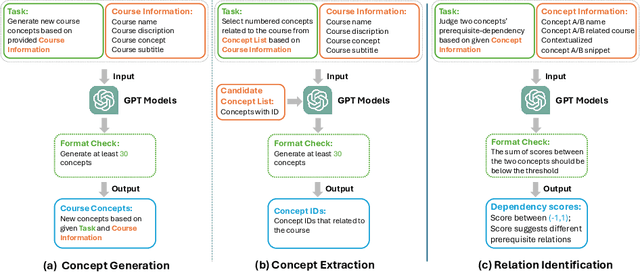
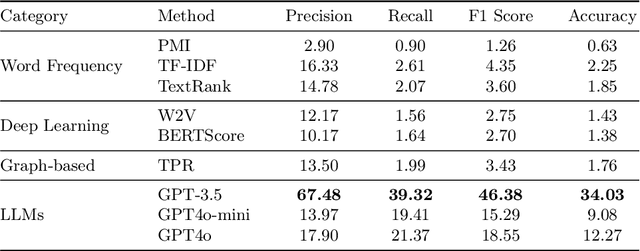
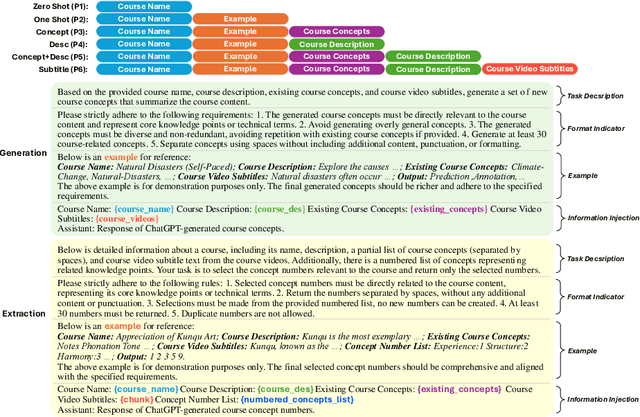
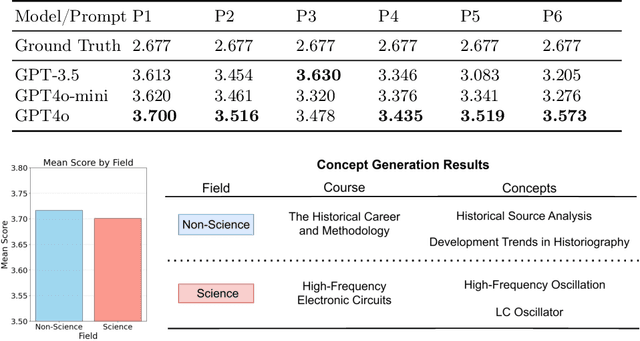
Abstract:Extracting key concepts and their relationships from course information and materials facilitates the provision of visualizations and recommendations for learners who need to select the right courses to take from a large number of courses. However, identifying and extracting themes manually is labor-intensive and time-consuming. Previous machine learning-based methods to extract relevant concepts from courses heavily rely on detailed course materials, which necessitates labor-intensive preparation of course materials. This paper investigates the potential of LLMs such as GPT in automatically generating course concepts and their relations. Specifically, we design a suite of prompts and provide GPT with the course information with different levels of detail, thereby generating high-quality course concepts and identifying their relations. Furthermore, we comprehensively evaluate the quality of the generated concepts and relationships through extensive experiments. Our results demonstrate the viability of LLMs as a tool for supporting educational content selection and delivery.
How Good Are Large Language Models for Course Recommendation in MOOCs?
Apr 11, 2025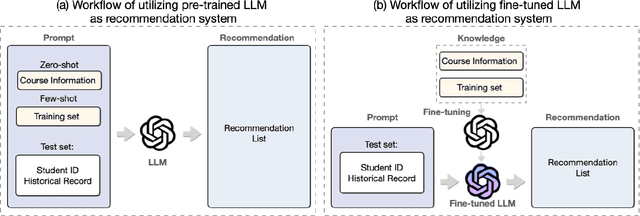

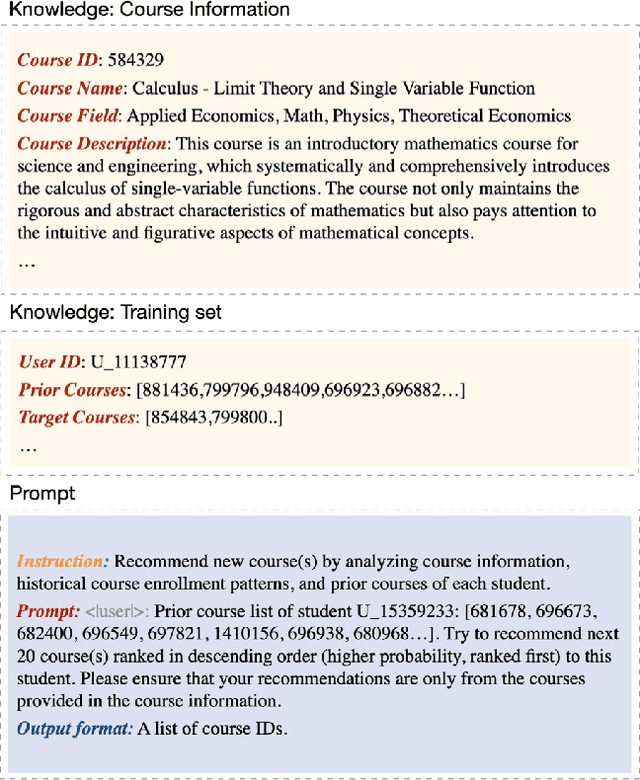

Abstract:Large Language Models (LLMs) have made significant strides in natural language processing and are increasingly being integrated into recommendation systems. However, their potential in educational recommendation systems has yet to be fully explored. This paper investigates the use of LLMs as a general-purpose recommendation model, leveraging their vast knowledge derived from large-scale corpora for course recommendation tasks. We explore a variety of approaches, ranging from prompt-based methods to more advanced fine-tuning techniques, and compare their performance against traditional recommendation models. Extensive experiments were conducted on a real-world MOOC dataset, evaluating using LLMs as course recommendation systems across key dimensions such as accuracy, diversity, and novelty. Our results demonstrate that LLMs can achieve good performance comparable to traditional models, highlighting their potential to enhance educational recommendation systems. These findings pave the way for further exploration and development of LLM-based approaches in the context of educational recommendations.
Design of AI-Powered Tool for Self-Regulation Support in Programming Education
Apr 07, 2025Abstract:Large Language Model (LLM) tools have demonstrated their potential to deliver high-quality assistance by providing instant, personalized feedback that is crucial for effective programming education. However, many of these tools operate independently from institutional Learning Management Systems, which creates a significant disconnect. This isolation limits the ability to leverage learning materials and exercise context for generating tailored, context-aware feedback. Furthermore, previous research on self-regulated learning and LLM support mainly focused on knowledge acquisition, not the development of important self-regulation skills. To address these challenges, we developed CodeRunner Agent, an LLM-based programming assistant that integrates the CodeRunner, a student-submitted code executing and automated grading plugin in Moodle. CodeRunner Agent empowers educators to customize AI-generated feedback by incorporating detailed context from lecture materials, programming questions, student answers, and execution results. Additionally, it enhances students' self-regulated learning by providing strategy-based AI responses. This integrated, context-aware, and skill-focused approach offers promising avenues for data-driven improvements in programming education.
 Add to Chrome
Add to Chrome Add to Firefox
Add to Firefox Add to Edge
Add to Edge